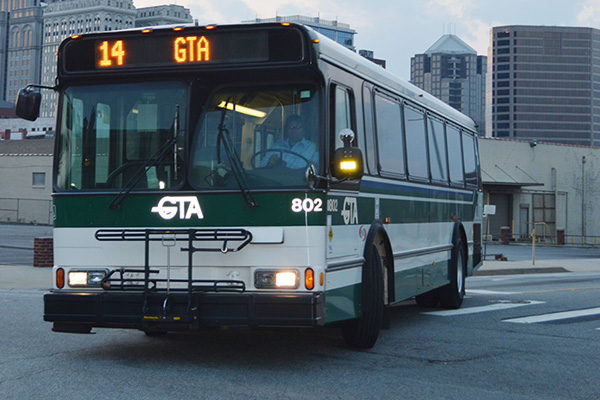The Greensboro Transit Authority (GTA), that runs Greensboro’s bus system, is bleeding ridership and money, according to a presentation the GTA is scheduled to make at the Tuesday, Dec. 4 meeting of the Greensboro City Council.
According to the GTA, ridership on the city’s regular bus routes also called fixed bus routes has dropped in every year since fiscal year 2012-2013. In fiscal year 2012-2013, GTA buses on fixed routes had a total of about 4.3 million riders. By fiscal year 2017-2018, fixed bus route ridership had dropped by over a million riders to about 3.26 million.
The GTA Board is projecting a $2.6 million deficit out of a $23.5 million budget for the 2018-2019 fiscal year, which began July 1. That $23.5 million is $58,000 less than the 2017-2018 budget.
The presentation makes an argument that the GTA’s increasing deficits are the result of the decrease in fixed bus route riders, and an increase in para-transit riders, increased maintenance costs and a decrease in state funding
Para-transit is direct site-to-site transportation for people with disabilities. In Greensboro, that is provided by GTA SCAT service, which, as the GTA describes it, provides “curb-to-curb and door-to-door service within the city limits of Greensboro.”
The GTA board says it costs the GTA $4.18 per trip for each fixed-route rider and $33 per trip for each SCAT rider.
The GTA charges $1.50 per ride for both fixed-route and SCAT rides. That’s slightly less than the $1.56 average fixed-route charge for comparable cities in North Carolina, and much less than the $2.63 average for para-transit charges in those cities.
The GTA board, at its Nov. 15 meeting, considered a staff proposal to make numerous changes to Greensboro bus routes to make them more efficient. “In a simplistic manner this is often perceived to be a service cut for GTA riders,” stated the staff recommendation on the GTA board’s agenda.
According to GTA staff, the reduction in stops and routes would be cost-neutral. If the GTA board implements the route changes, they would take effect at the beginning of the next fiscal year on July 1, 2019.
The staff recommendation to cut routes and stops stated, “The culture of GTA’s decisions has historically favored providing more coverage at the expense of efficiency, which makes the following recommendations a challenge.”


Well, you guys sure messed up a good thing. Id be willing to subscribe to the paper version, but the online version is terrible. Its really hard to navigate and not much there anyway.
Please give us some news, where is the news?
The local news that matters is not in the Fishwrap, or on TV. Why don’t you attend some govt meetings open to the public? The Rhino alone does this for you, no one else does.
Wonder why people don’t ride buses… GTA employees should be required to get to work by bus, maybe then they would realize lunacy of all buses coming to the depot.
Instead they should do a survey of passenger streams. Then they could draw errors that don’t take 2 hours to get to a point where you can get in the car in no more than 20 minutes. If a trip wouldn’t be more than 30 minutes (and in Greensboro shouldn’t take longer) than some people could switch to buses. In civilized world it is considered that you should be able to a bus stop walking less than 5 minutes.
And here they are with solution to their problems being cutting routs and stops. Makes absolute sense. Less accessible transit is supposed to draw people in.
Greensboro should look into mothballing the GTA in favor of an arrangement with Lyft and Uber. A reduced rate for in city rides could be negotiated along with a modest subsidy from Greensboro. The cost of transportation to the city and the time of travel would be significantly reduced. It also would provide higher utility of local cars and drivers, offering additional employment options for our citizens. I suspect that the number of people buying personal cars would decrease over time, which could result in less need for parking facilities.
If citizens don’t want to use GTA, why do we need to use taxpayer dollars to support it? Per rider, it is obscenely expensive.